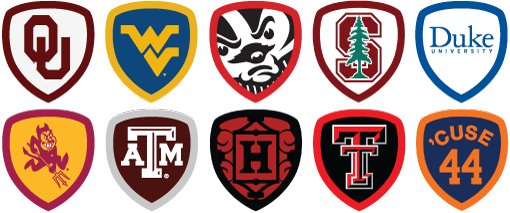 Registration looks like it was just as big of a pain in the ass in 1941 as is now (and rather gender biased). Photo courtesy of Cushing Memorial Library and Archives, Texas A&M. Licensed under CC BY-2.0.Different universities do it different ways, but perhaps one of the most exciting times for freshmen coming into college is class registration (or maybe it just was for me because I am a huge nerd). Some universties have freshmen register months before the first day of school, and some don't have registration until a few days before classes start. Whatever the case is, registration is an important time for new students because it will determine just about everything for the next three or four months of your life. It's daunting and a little terrifying to think about, but with these tips for students entering college for the first time, hopefully you will make great choices for your first semester in college.
Registration looks like it was just as big of a pain in the ass in 1941 as is now (and rather gender biased). Photo courtesy of Cushing Memorial Library and Archives, Texas A&M. Licensed under CC BY-2.0.Different universities do it different ways, but perhaps one of the most exciting times for freshmen coming into college is class registration (or maybe it just was for me because I am a huge nerd). Some universties have freshmen register months before the first day of school, and some don't have registration until a few days before classes start. Whatever the case is, registration is an important time for new students because it will determine just about everything for the next three or four months of your life. It's daunting and a little terrifying to think about, but with these tips for students entering college for the first time, hopefully you will make great choices for your first semester in college.
Prepare Ahead of Time
It is always a good idea to prepare yourself before registration. It's usually a time of scrambling and cursing at slow computer servers or full classes, so the more prepared you are before hand, the better your registration will go. Take some time to get to know your university's course schedule. Highlight classes you'd like to take and classes you must take. Try to get a feel for what you'd like your schedule will be like. Are you a morning or afternoon person? When do you do homework better?
You will probably not get your perfect schedule, so it's extremely important to have backup options. Make a list of the classes you want and categorize them into priorities, either by classes you must take or ones you want to take. List your backups as well so you can refer to them if you need to fill your schedule. Again, the more prepared you are, the smoother registration will go and the better chance you have of getting a schedule that you're satisfied with. I went just a little big overboard with preparing for my first semester registration (oh man, you should see the spreadsheets I made and how unbelieveably color-coordinated they were), but it all paid out in the end because I got the schedule I wanted.
How Many Hours
Depending on your school, your advisor will probably let you know how many hours you should take per semester. For Trinity, I needed to average about 15.5 hours a semester in order to graduate with the necessary amount of hours. However, since I came into school with some AP credits, I had a bit of a cushion. I decided to take only 13 hours (four classes, plus a dance class) my first semester, and I would encourage freshmen to take it easy on themselves their first semester.
College is a huge jump for anyone. You're moving to a new place, without your parents, with new friends. The adjustment period can take a long time. Figuring out all of that other stuff plus figuring out how to study for college is a massive undertaking. It is perfectly acceptable, and I think even a good idea, to take just a minimum amount of classes your first semester to ease yourself into the college atmosphere. You can take more hours once you've gotten into the college swing, but freshman year is so crazy that it's a good idea not to overload yourself academically right from the start. Work hard in the few classes you do have and get good grades in those. The worst thing you can do is to take too many classes and do poorly your first semester.
Try for Variety but Get Requirements Out of the Way
I am speaking as a student of a liberal arts college, and so I had an immense amount of freedom in choosing what classes I wanted to take in the first two years of my college education. I was taking philosophy, psychology, dance, anthropology, communication, biology, calculus, sociology, and so much more. Now I didn't necessarily enjoy all of these subjects (bleh philosophy), but I am certainly thankful that I took all of them, even if doing so taught me that that subject was certainly not my calling. Additionally, taking a wide variety of classes allowed me to really round out my college education. I learned a lot of stuff that I may not use in my career in the future, but I feel like I know a lot more about the world and life because of the classes I took that were not remotely related to either of my majors.
While I certainly encourage freshmen to test the waters on any subject that they find even remotely interesting, I also think it is a really good idea to get your required classes out of the way sooner rather than later. If you're getting super bummed out by the fact that you have all of these common cirriculum classes that you have to take, feel free to spread them out a bit-- take two or three a semester plus a few elective classes. However, don't push these classes off completely. I can tell you from personal experience that it completely sucks having to take a random, entry level class your senior year. Come up with a strategy for completing those required classes, but definitely make sure that you take a few risks with your class choices. You never know, you might really find yourself drawn to the subject.
What was your experience during freshmen registration? What tips do you have for new freshmen who are registering? Let us know in the comments!
 Colleges around the world are increasingly turning to social media to connect with students.Brochures and leaflets may soon be replaced by Tweets and wall posts as college admissions offices invest more resources in online social networking.
Colleges around the world are increasingly turning to social media to connect with students.Brochures and leaflets may soon be replaced by Tweets and wall posts as college admissions offices invest more resources in online social networking.






 Sunday, July 31, 2011
Sunday, July 31, 2011




